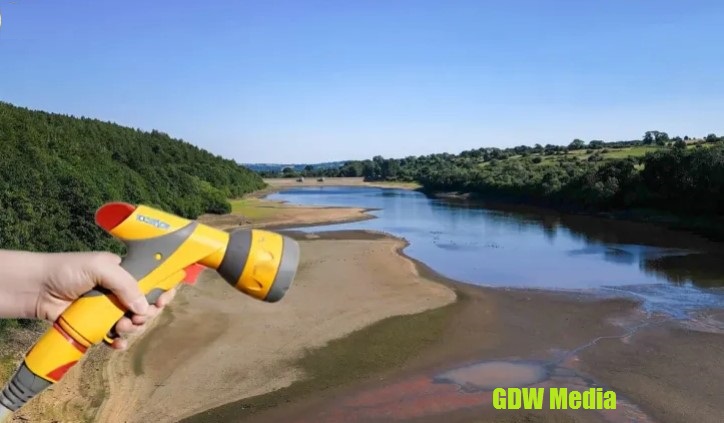
![]()
Yorkshire Water has announced a hosepipe ban starting Friday, July 11, 2025, affecting over 5 million customers across Yorkshire after the region’s driest spring in 132 years. With reservoir levels at a critical 55.8% to 26.1% below normal and a drought officially declared in June, the Temporary Use Ban (TUB) aims to conserve water amid forecasts of a warm, dry summer. This guide explains the ban’s rules, exemptions, potential fines up to £3,000, and practical ways to save water. As Yorkshire grapples with low rainfall and rising bills, we also explore the broader issues fueling public frustration, from leaks to executive bonuses. Stay informed and learn how to comply with Yorkshire Water’s restrictions.
Why Is Yorkshire Water Imposing a Hosepipe Ban?
Yorkshire recorded just 15cm of rainfall between February and June 2025, less than half the average, marking the driest spring since 1852, according to the Met Office. Reservoir levels, normally around 80% in early July, have plummeted to 50–55.8%, with no significant recharge since January. The Environment Agency declared Yorkshire in drought status in June, prompting Yorkshire Water to enact its drought plan. Dave Kaye, Yorkshire Water’s director of water, emphasized the need to “protect Yorkshire’s environment” and ensure essential water supplies, warning that the ban could last into winter without substantial rain.
The ban also allows Yorkshire Water to apply for drought permits, enabling more river water abstraction and reduced reservoir outflows to maintain supplies. However, this move has sparked concerns from the Rivers Trust, with CEO Mark Lloyd warning that increased river withdrawals could harm wildlife already stressed by low flows. The region’s high water demand 4.3 billion extra liters supplied from April to June further strains resources, driven by a 500,000 population increase since 2000 without new reservoirs since 1966.
What Are the Hosepipe Ban Rules?
Starting July 11, 2025, Yorkshire Water’s hosepipe ban prohibits using hosepipes for non-essential activities across all areas it supplies, including West Yorkshire, South Yorkshire, East Riding, North Yorkshire, and parts of North Lincolnshire and Derbyshire. The banned activities include:
- Watering gardens or plants with a hosepipe or sprinkler
- Washing private vehicles (cars, vans, boats)
- Filling domestic pools or paddling pools
- Cleaning outdoor surfaces (paths, patios, walls)
- Using hosepipes for domestic recreation (e.g., water fights)
- Filling ornamental fountains or ponds
- Cleaning windows with a hosepipe
Customers can still perform these tasks using tap water from a bucket or watering can, or non-mains water (e.g., rainwater from butts or private boreholes). Businesses may use hosepipes for essential commercial purposes, such as watering crops or operating car washes, but non-essential uses (e.g., cleaning a shop’s path) are banned. Exemptions apply to Blue Badge holders, those on Yorkshire Water’s Priority Services Register, or customers on the WaterSure tariff for medical reasons.
Fines and Enforcement
Breaking the hosepipe ban could result in fines up to £1,000–£3,000, depending on enforcement actions If violations persist, the company may escalate enforcement after reminders. Customers are not explicitly asked to report neighbors, but Yorkshire Water encourages reporting repeated breaches for follow-up. The company is not planning street patrols but relies on community cooperation to conserve water.
Public Frustration and Controversies
The ban has sparked mixed reactions. Shoppers in Leeds told the BBC that Yorkshire Water should reduce bills, currently averaging £430 and set to rise 35% by 2030, to reflect restricted usage. One resident, Stuart Thomson, called the bills “extortionate” for his one-bedroom flat. Critics also point to Yorkshire Water’s failure to address leaks, with 2024 seeing thousands affected by a burst pipe, and executive bonuses totaling £616,000 despite service issues. Ofwat’s 2025 ban on “unfair” bonuses for Yorkshire Water and five other providers highlights ongoing performance concerns.
Yorkshire Water has responded with a £406m investment to replace 1,000km of water mains and install 1.3 million smart meters to detect leaks, plus 100 new staff for leak repairs in 2025. However, the lack of new reservoirs since Thruscross in 1966, despite a growing population, raises questions about long-term water security, especially as climate change drives more frequent dry springs.
Key Details of the Yorkshire Water Hosepipe Ban
The table below summarizes the ban’s key aspects and impacts, based on Yorkshire Water’s announcements and media reports:
| Aspect | Details | Impact |
|---|---|---|
| Effective Date | July 11, 2025, until significant rainfall | Affects 5M+ customers; may last into winter |
| Prohibited Uses | Hosepipe use for gardens, cars, pools, surfaces | Forces use of buckets, watering cans; fines up to £3,000 |
| Exemptions | Blue Badge holders, Priority Services, WaterSure users | Protects vulnerable groups; businesses allowed for essential use |
| Reservoir Levels | 50–55.8%, 26.1% below normal | Prompts drought permits, risking river ecosystems |
How to Comply and Save Water
To avoid fines and help Yorkshire’s reservoirs recover, follow these tips:
- Use Alternatives: Water gardens with a watering can or collected rainwater. Wash cars with a bucket and sponge. Commercial car washes remain open.
- Conserve at Home: Take shorter showers (aim for 4 minutes), turn off taps while brushing teeth, and run full loads in washing machines and dishwashers. The Environment Agency suggests these can save up to 20% of household water.
- Collect Rainwater: Use water butts to store rainwater for gardening, reducing reliance on mains water.
- Check for Leaks: Report household leaks to Yorkshire Water’s 24/7 team via their website or hotline. Smart meters can help detect hidden leaks.
- Stay Informed: Use Yorkshire Water’s postcode checker on YorkshireWater.com to confirm if the ban applies to you, especially if you’re a NAV customer.
What’s Next for Yorkshire Water and the Region?
The hosepipe ban, Yorkshire’s third in 30 years, follows a 2022 ban that lasted from August to December. Without significant rainfall, reservoir levels may drop further, potentially leading to stricter measures like water rationing. Thames Water, serving 16 million customers, warned of a possible ban due to similar dry conditions, signaling a national crisis. The Environment Agency notes that England’s driest spring in 132 years and warmest June on record exacerbate the situation, with other regions like the northwest already in drought.
Yorkshire Water’s long-term plans include borehole projects in Brayton and East Ness to tap new water sources and £406m in infrastructure upgrades. However, critics argue these are insufficient without new reservoirs, especially as climate change increases drought frequency (three dry springs in 14 years). The Rivers Trust warns that drought permits could further stress rivers, impacting fish and wildlife.
How to Support Yorkshire’s Water Conservation
Beyond following the ban, you can help by reporting leaks to Yorkshire Water and supporting conservation campaigns. The Environment Agency’s tips, like deleting old emails to reduce data center water use, offer creative ways to cut usage. Advocate for sustainable water policies by engaging with local MPs or joining groups like the Wildlife Trusts, which call for stronger environmental protections. If you’re affected by rising bills, check eligibility for Yorkshire Water’s WaterSure or Priority Services Register for support.
FAQs About the Yorkshire Water Hosepipe Ban 2025
1. When does the Yorkshire Water hosepipe ban start?
The ban begins July 11, 2025, and may last until winter, depending on rainfall. It affects all Yorkshire Water customers across Yorkshire.
2. What can’t I do under the hosepipe ban?
You cannot use a hosepipe to water gardens, wash cars, fill pools, or clean outdoor surfaces. Buckets, watering cans, or non-mains water are allowed.
3. Who is exempt from the hosepipe ban?
Blue Badge holders, Priority Services Register members, and WaterSure tariff users for medical reasons are exempt. Businesses can use hosepipes for essential commercial purposes.
4. What are the fines for breaking the ban?
Violators face fines up to £1,000–£3,000. Yorkshire Water encourages voluntary compliance but may escalate enforcement for repeated breaches.
5. Why are Yorkshire’s reservoirs so low?
Only 15cm of rain fell from February to June 2025, the driest spring in 132 years. High demand and no new reservoirs since 1966 have worsened the shortage.
The Yorkshire Water hosepipe ban reflects a critical moment for the region as it battles drought and strained resources. By following the rules, conserving water, and staying informed via trusted sources like The Guardian and YorkshireWater.com, you can help protect Yorkshire’s water supply. As the region faces a potentially long dry spell, collective action is key to ensuring essential needs are met.
 GDW Media
GDW Media


